Property Manager Resume Examples

Jul 18, 2024
|
12 min read
Crafting Your Perfect Property Manager Resume: Building Your Case for Success in the Real Estate World! Learn key tips and tricks to showcase your skills and experience in an impactful way.
Rated by 348 people
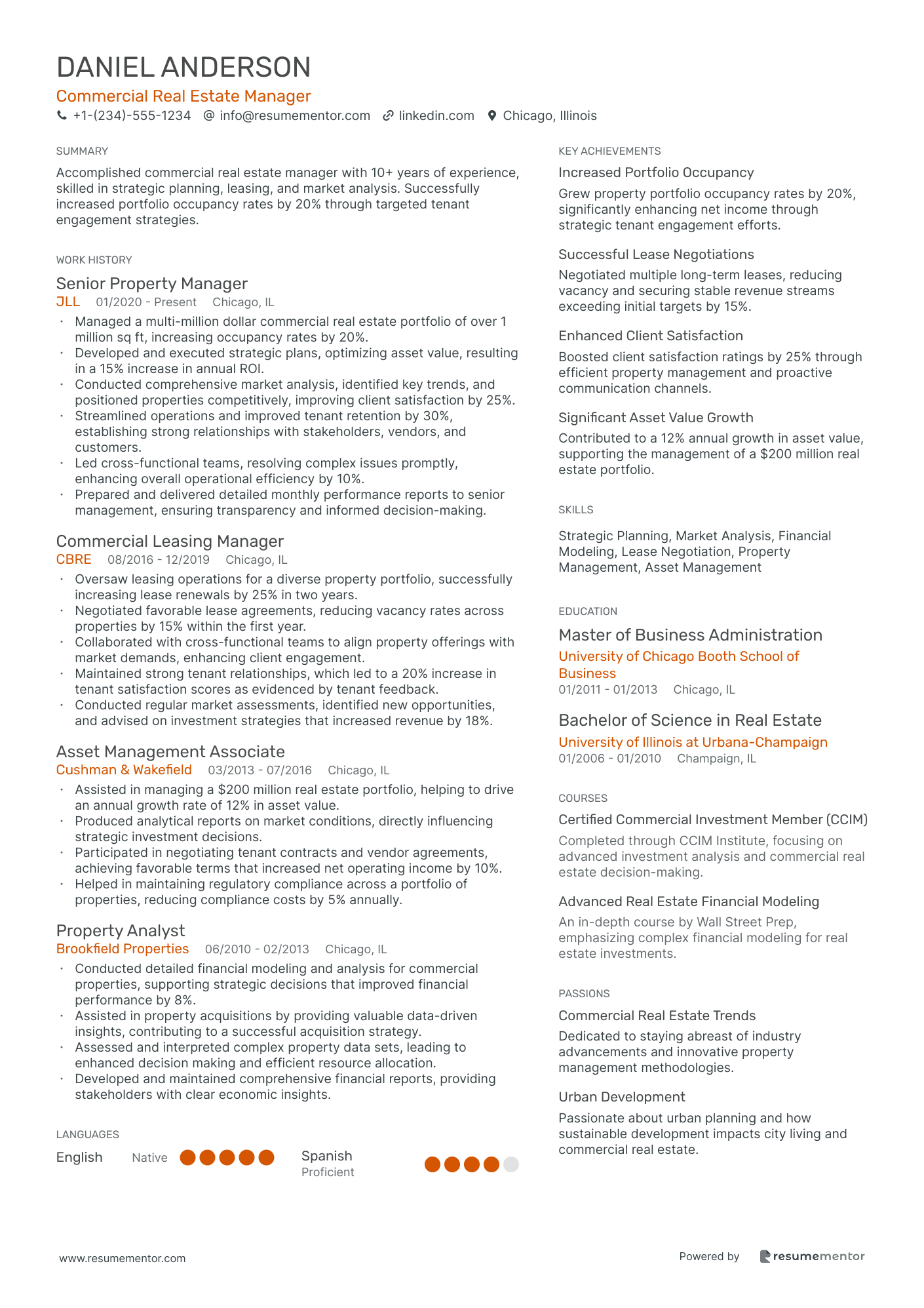
Commercial Real Estate Manager
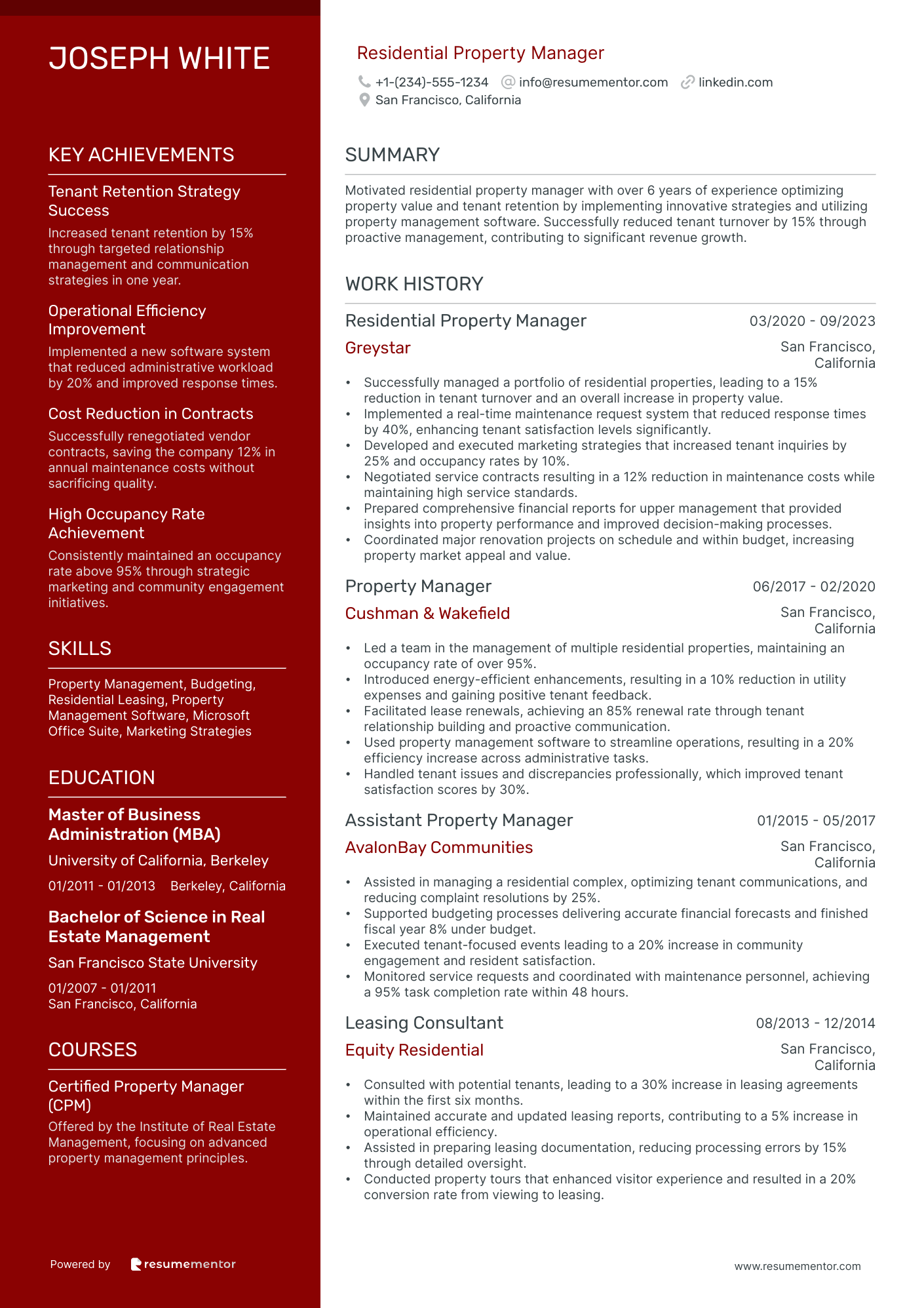
Residential Property Manager
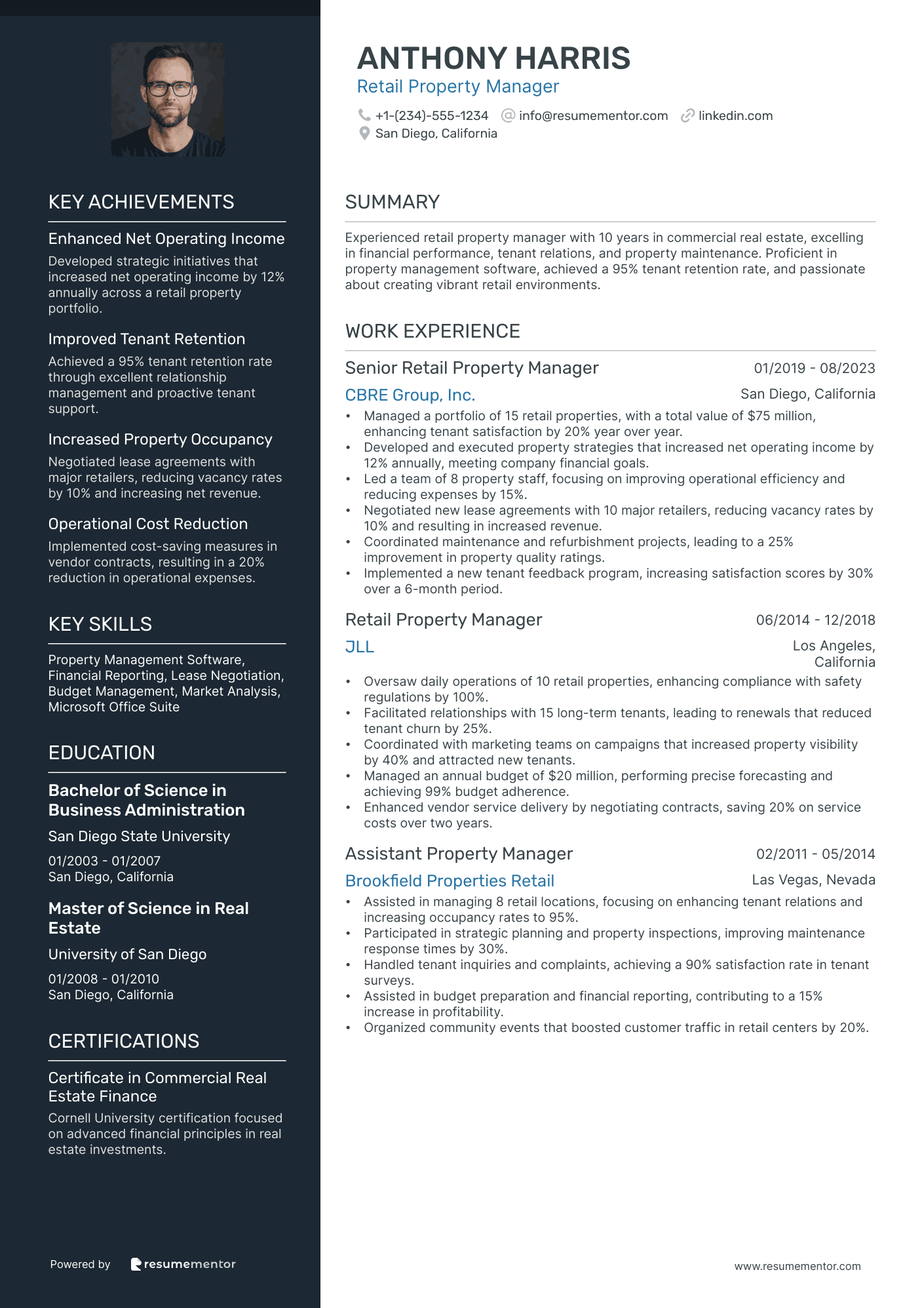
Retail Property Manager
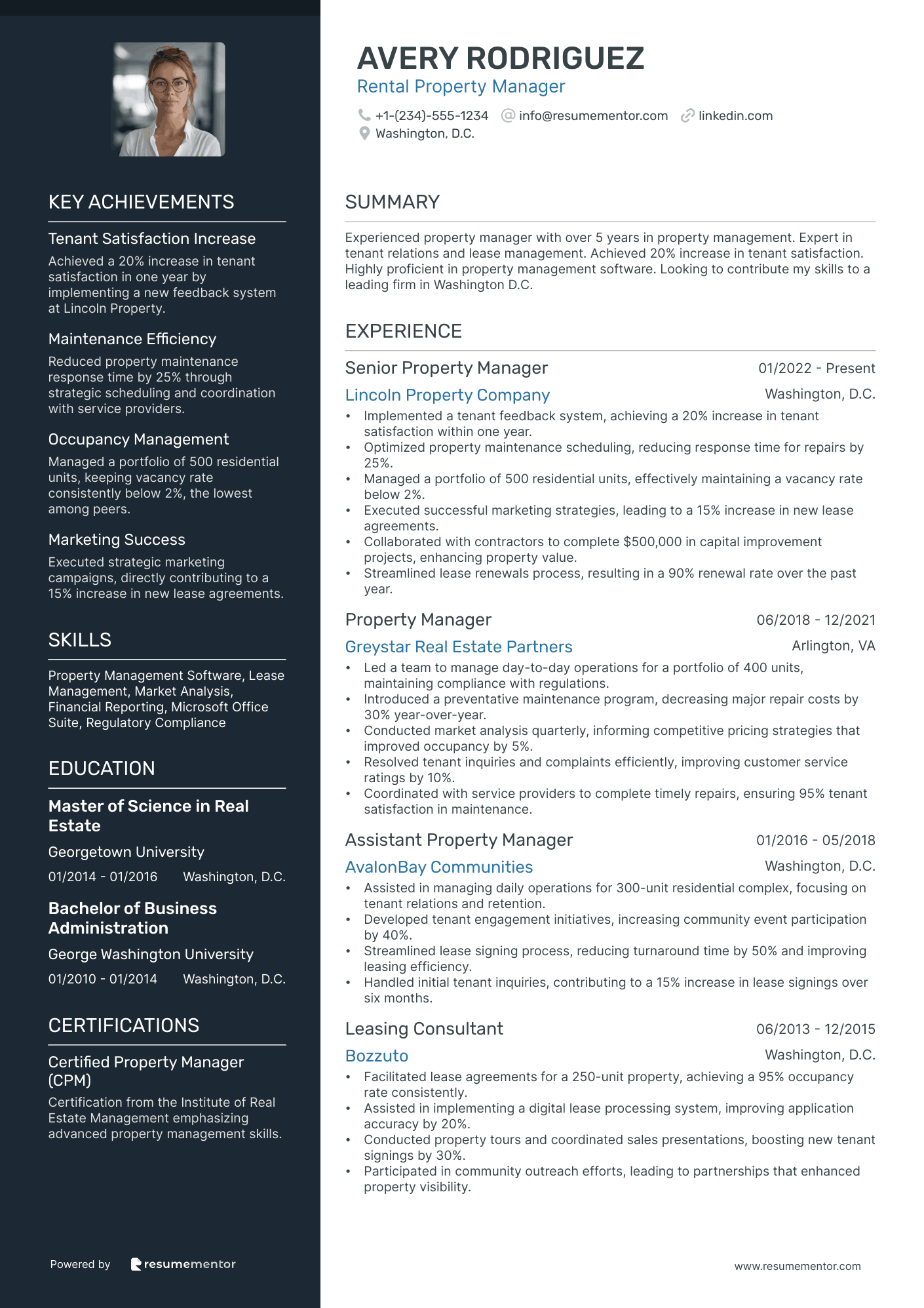
Rental Property Manager
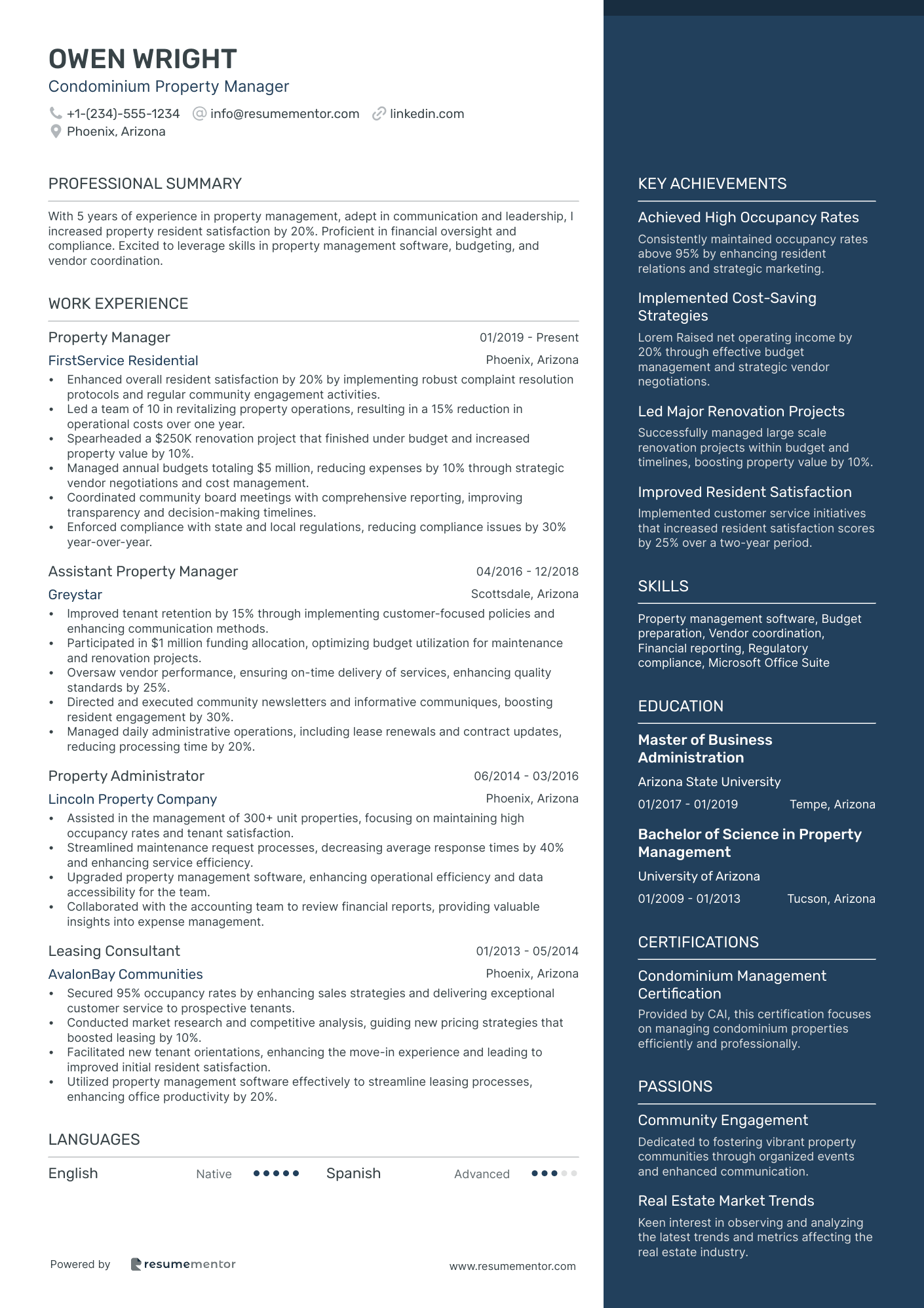
Condominium Property Manager
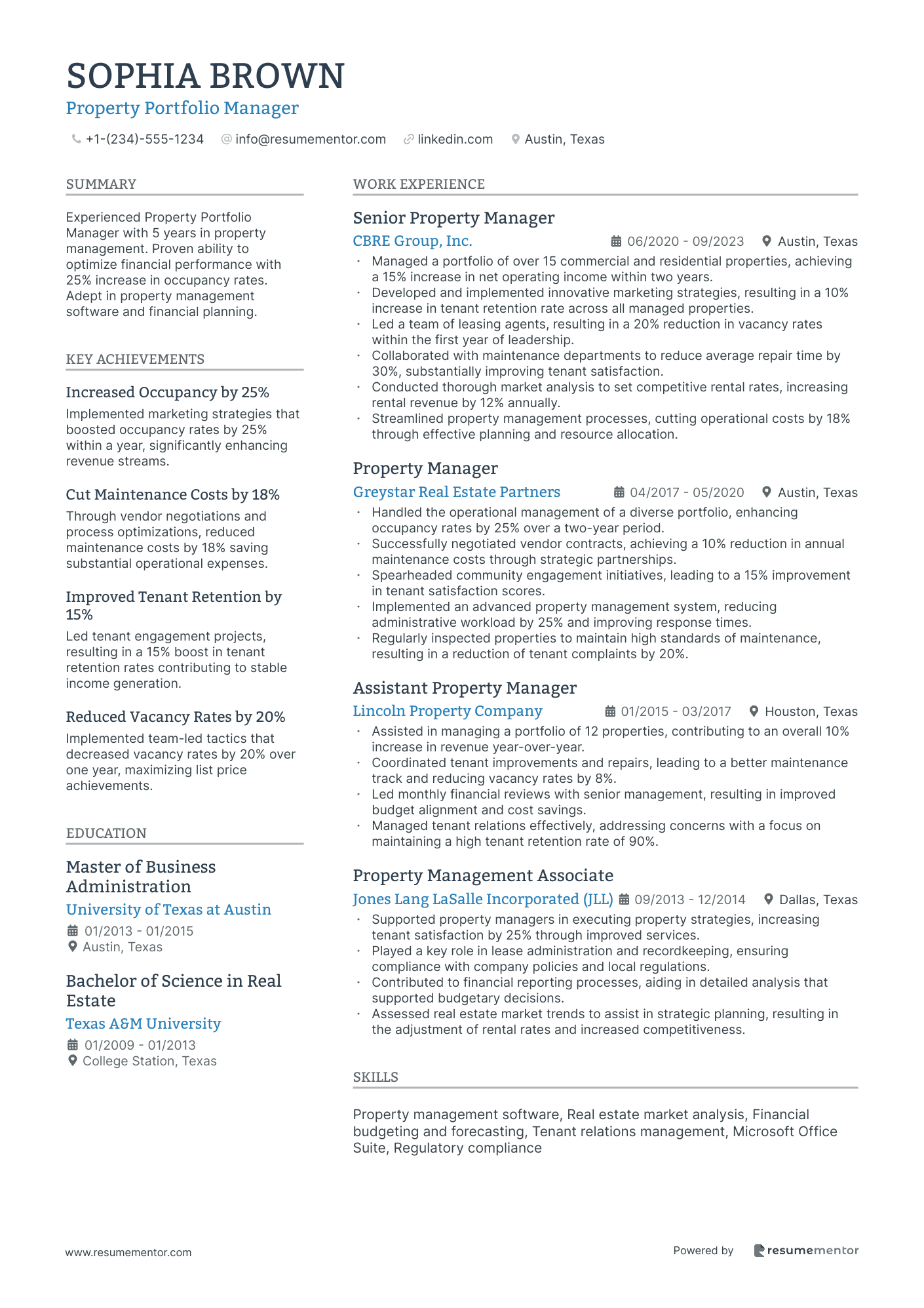
Property Portfolio Manager
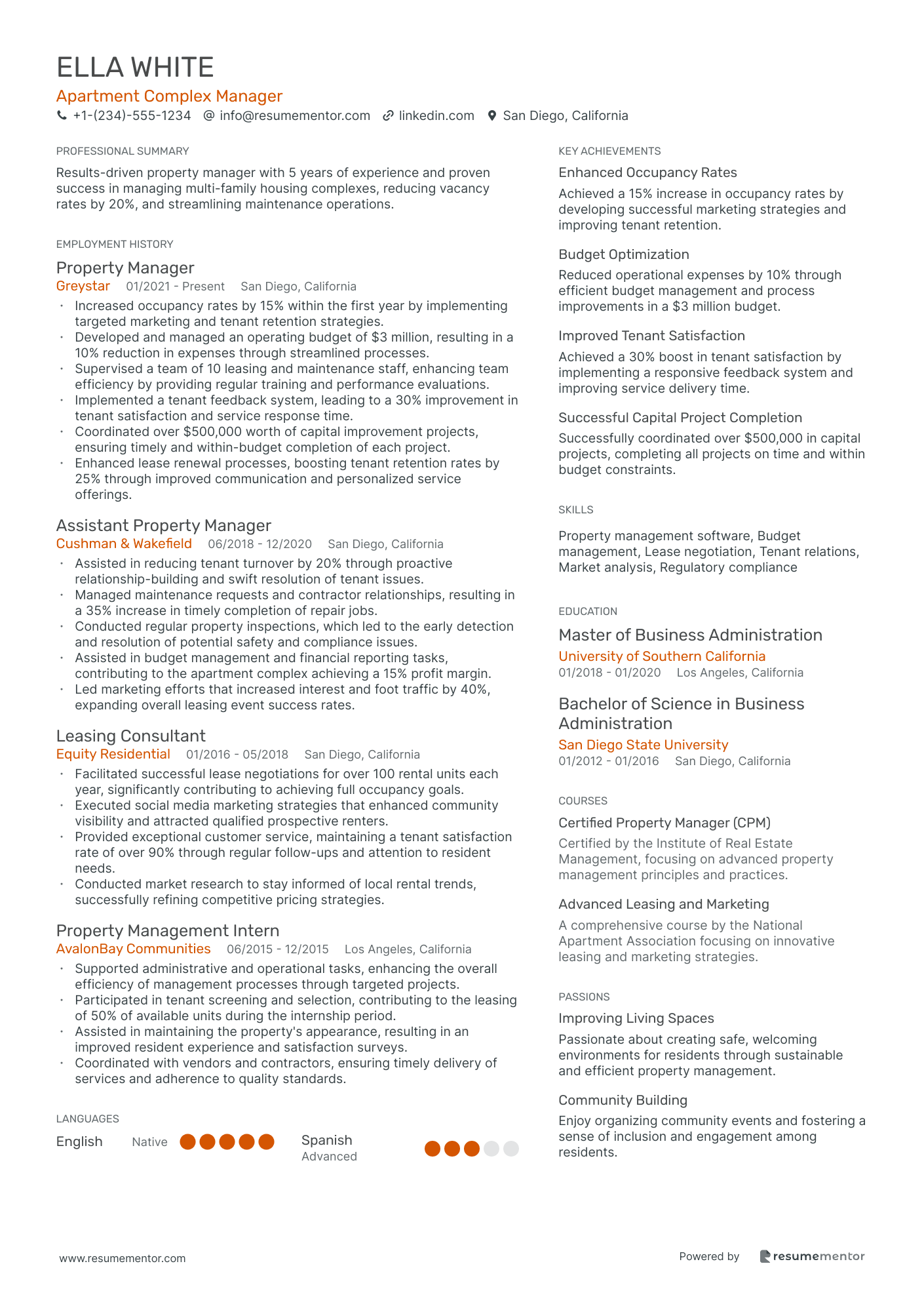
Apartment Complex Manager
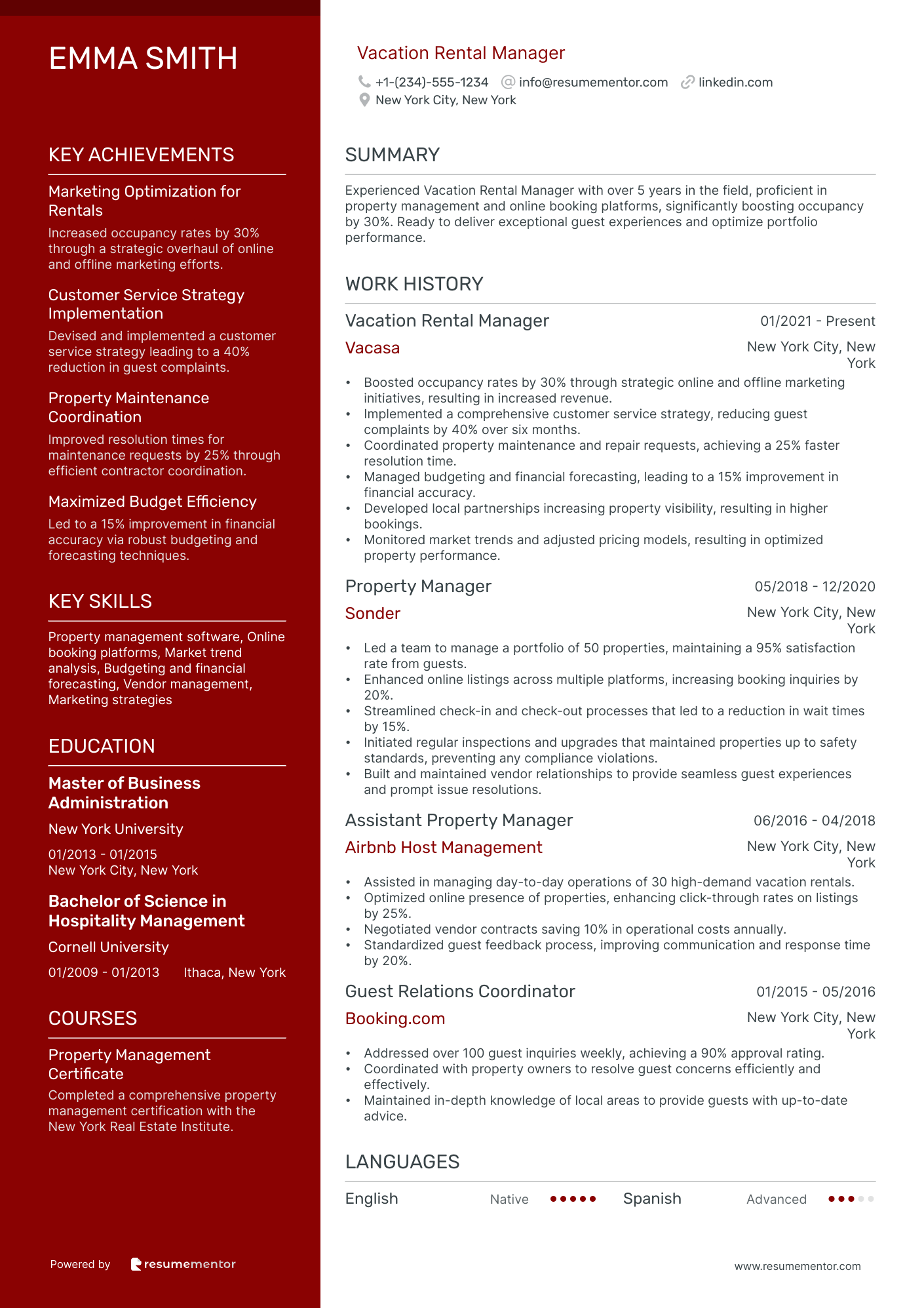
Vacation Rental Manager
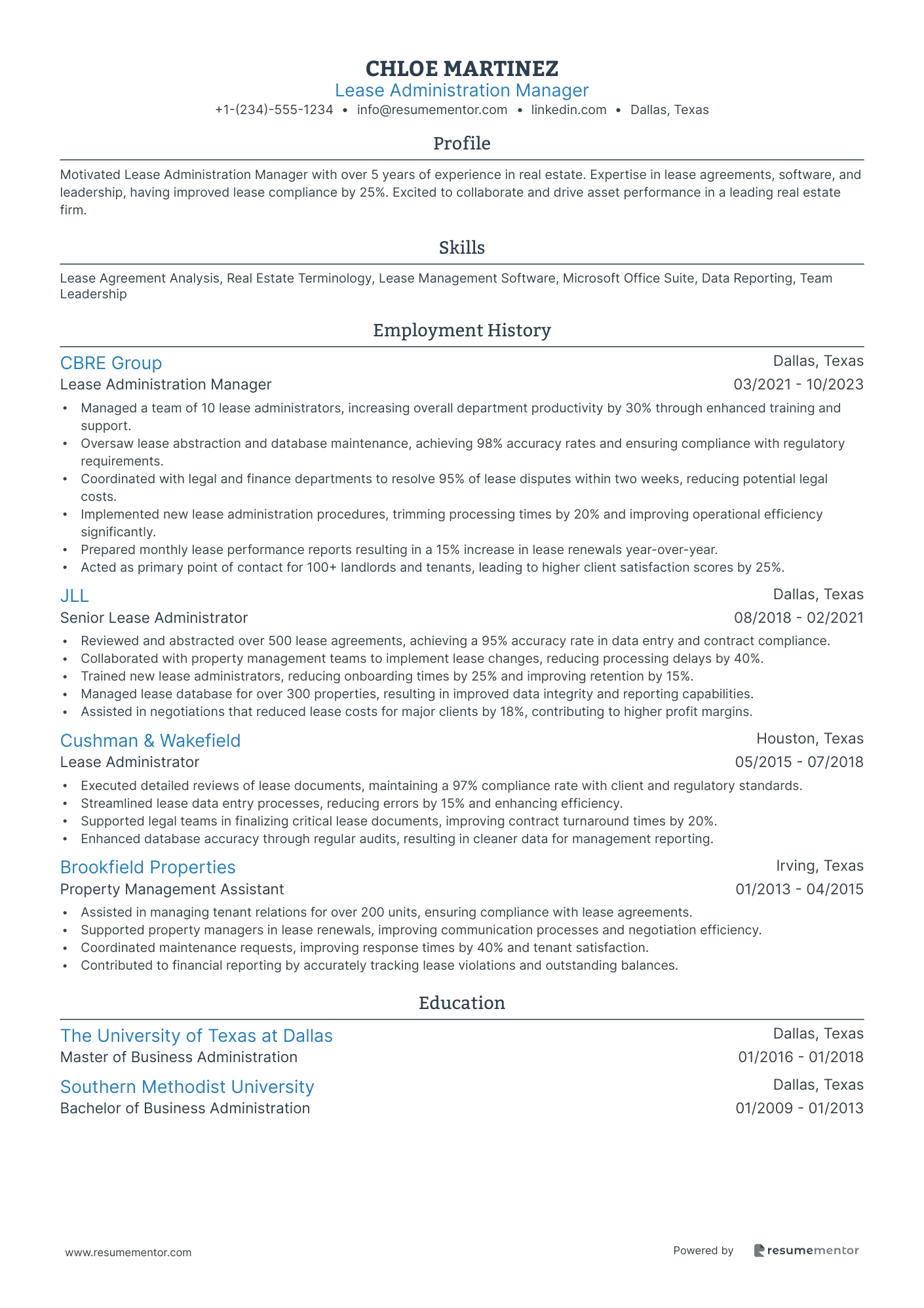
Lease Administration Manager
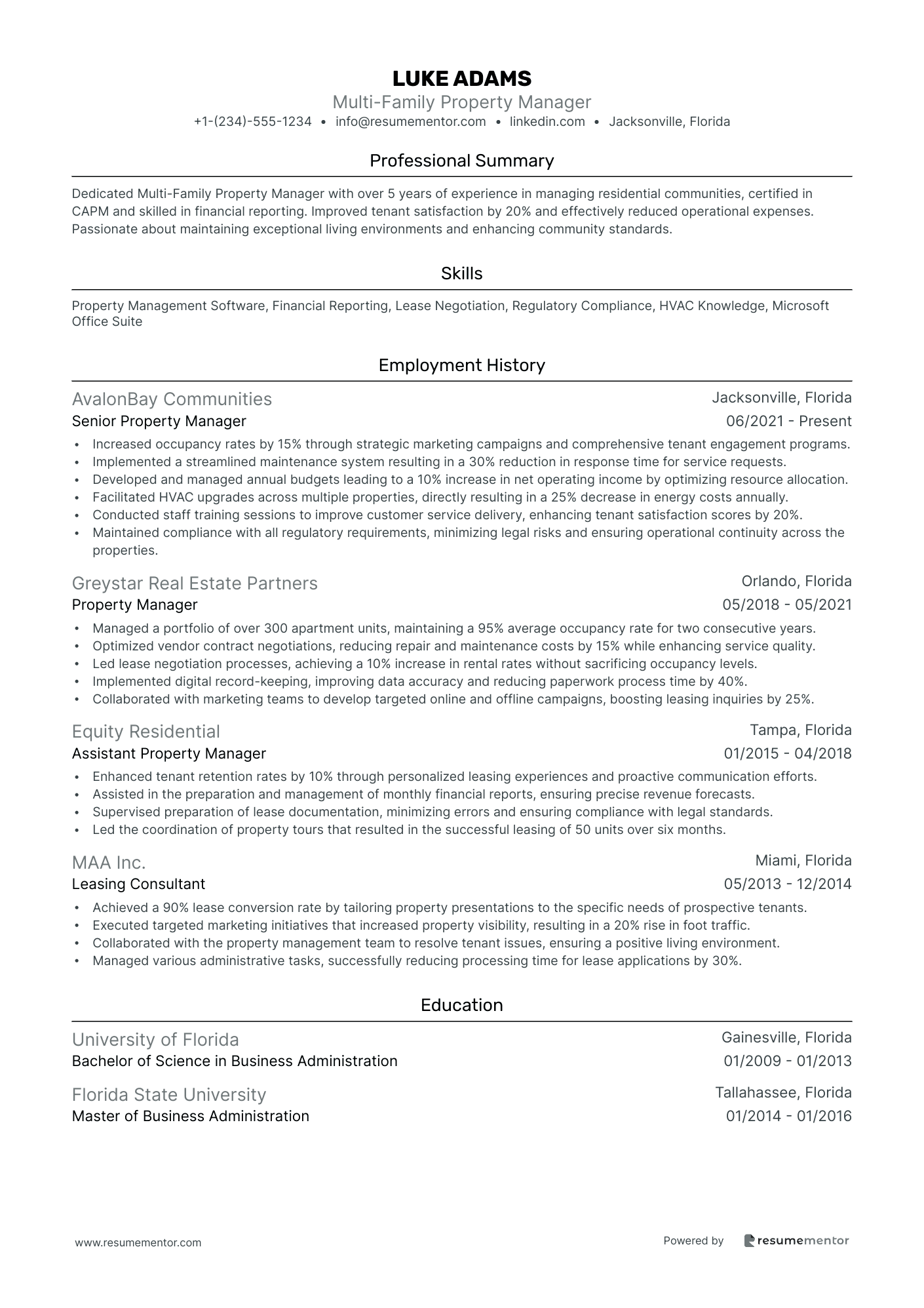
Multi-Family Property Manager

Commercial Real Estate Manager resume sample
- •Managed a multi-million dollar commercial real estate portfolio of over 1 million sq ft, increasing occupancy rates by 20%.
- •Developed and executed strategic plans, optimizing asset value, resulting in a 15% increase in annual ROI.
- •Conducted comprehensive market analysis, identified key trends, and positioned properties competitively, improving client satisfaction by 25%.
- •Streamlined operations and improved tenant retention by 30%, establishing strong relationships with stakeholders, vendors, and customers.
- •Led cross-functional teams, resolving complex issues promptly, enhancing overall operational efficiency by 10%.
- •Prepared and delivered detailed monthly performance reports to senior management, ensuring transparency and informed decision-making.
- •Oversaw leasing operations for a diverse property portfolio, successfully increasing lease renewals by 25% in two years.
- •Negotiated favorable lease agreements, reducing vacancy rates across properties by 15% within the first year.
- •Collaborated with cross-functional teams to align property offerings with market demands, enhancing client engagement.
- •Maintained strong tenant relationships, which led to a 20% increase in tenant satisfaction scores as evidenced by tenant feedback.
- •Conducted regular market assessments, identified new opportunities, and advised on investment strategies that increased revenue by 18%.
- •Assisted in managing a $200 million real estate portfolio, helping to drive an annual growth rate of 12% in asset value.
- •Produced analytical reports on market conditions, directly influencing strategic investment decisions.
- •Participated in negotiating tenant contracts and vendor agreements, achieving favorable terms that increased net operating income by 10%.
- •Helped in maintaining regulatory compliance across a portfolio of properties, reducing compliance costs by 5% annually.
- •Conducted detailed financial modeling and analysis for commercial properties, supporting strategic decisions that improved financial performance by 8%.
- •Assisted in property acquisitions by providing valuable data-driven insights, contributing to a successful acquisition strategy.
- •Assessed and interpreted complex property data sets, leading to enhanced decision making and efficient resource allocation.
- •Developed and maintained comprehensive financial reports, providing stakeholders with clear economic insights.
Residential Property Manager resume sample
- •Successfully managed a portfolio of residential properties, leading to a 15% reduction in tenant turnover and an overall increase in property value.
- •Implemented a real-time maintenance request system that reduced response times by 40%, enhancing tenant satisfaction levels significantly.
- •Developed and executed marketing strategies that increased tenant inquiries by 25% and occupancy rates by 10%.
- •Negotiated service contracts resulting in a 12% reduction in maintenance costs while maintaining high service standards.
- •Prepared comprehensive financial reports for upper management that provided insights into property performance and improved decision-making processes.
- •Coordinated major renovation projects on schedule and within budget, increasing property market appeal and value.
- •Led a team in the management of multiple residential properties, maintaining an occupancy rate of over 95%.
- •Introduced energy-efficient enhancements, resulting in a 10% reduction in utility expenses and gaining positive tenant feedback.
- •Facilitated lease renewals, achieving an 85% renewal rate through tenant relationship building and proactive communication.
- •Used property management software to streamline operations, resulting in a 20% efficiency increase across administrative tasks.
- •Handled tenant issues and discrepancies professionally, which improved tenant satisfaction scores by 30%.
- •Assisted in managing a residential complex, optimizing tenant communications, and reducing complaint resolutions by 25%.
- •Supported budgeting processes delivering accurate financial forecasts and finished fiscal year 8% under budget.
- •Executed tenant-focused events leading to a 20% increase in community engagement and resident satisfaction.
- •Monitored service requests and coordinated with maintenance personnel, achieving a 95% task completion rate within 48 hours.
- •Consulted with potential tenants, leading to a 30% increase in leasing agreements within the first six months.
- •Maintained accurate and updated leasing reports, contributing to a 5% increase in operational efficiency.
- •Assisted in preparing leasing documentation, reducing processing errors by 15% through detailed oversight.
- •Conducted property tours that enhanced visitor experience and resulted in a 20% conversion rate from viewing to leasing.
Retail Property Manager resume sample
- •Managed a portfolio of 15 retail properties, with a total value of $75 million, enhancing tenant satisfaction by 20% year over year.
- •Developed and executed property strategies that increased net operating income by 12% annually, meeting company financial goals.
- •Led a team of 8 property staff, focusing on improving operational efficiency and reducing expenses by 15%.
- •Negotiated new lease agreements with 10 major retailers, reducing vacancy rates by 10% and resulting in increased revenue.
- •Coordinated maintenance and refurbishment projects, leading to a 25% improvement in property quality ratings.
- •Implemented a new tenant feedback program, increasing satisfaction scores by 30% over a 6-month period.
- •Oversaw daily operations of 10 retail properties, enhancing compliance with safety regulations by 100%.
- •Facilitated relationships with 15 long-term tenants, leading to renewals that reduced tenant churn by 25%.
- •Coordinated with marketing teams on campaigns that increased property visibility by 40% and attracted new tenants.
- •Managed an annual budget of $20 million, performing precise forecasting and achieving 99% budget adherence.
- •Enhanced vendor service delivery by negotiating contracts, saving 20% on service costs over two years.
- •Assisted in managing 8 retail locations, focusing on enhancing tenant relations and increasing occupancy rates to 95%.
- •Participated in strategic planning and property inspections, improving maintenance response times by 30%.
- •Handled tenant inquiries and complaints, achieving a 90% satisfaction rate in tenant surveys.
- •Assisted in budget preparation and financial reporting, contributing to a 15% increase in profitability.
- •Organized community events that boosted customer traffic in retail centers by 20%.
- •Conducted market analysis on 50 retail properties, resulting in accurate valuation and increased property appraisal accuracy by 15%.
- •Developed financial models supporting leasing decisions that resulted in successful lease negotiations with a total value of $5 million.
- •Generated comprehensive reports and presentations for senior management that improved decision-making processes by 25%.
- •Supported team in the due diligence of property acquisitions, contributing to successful acquisition of 3 major retail properties.
Rental Property Manager resume sample
- •Implemented a tenant feedback system, achieving a 20% increase in tenant satisfaction within one year.
- •Optimized property maintenance scheduling, reducing response time for repairs by 25%.
- •Managed a portfolio of 500 residential units, effectively maintaining a vacancy rate below 2%.
- •Executed successful marketing strategies, leading to a 15% increase in new lease agreements.
- •Collaborated with contractors to complete $500,000 in capital improvement projects, enhancing property value.
- •Streamlined lease renewals process, resulting in a 90% renewal rate over the past year.
- •Led a team to manage day-to-day operations for a portfolio of 400 units, maintaining compliance with regulations.
- •Introduced a preventative maintenance program, decreasing major repair costs by 30% year-over-year.
- •Conducted market analysis quarterly, informing competitive pricing strategies that improved occupancy by 5%.
- •Resolved tenant inquiries and complaints efficiently, improving customer service ratings by 10%.
- •Coordinated with service providers to complete timely repairs, ensuring 95% tenant satisfaction in maintenance.
- •Assisted in managing daily operations for 300-unit residential complex, focusing on tenant relations and retention.
- •Developed tenant engagement initiatives, increasing community event participation by 40%.
- •Streamlined lease signing process, reducing turnaround time by 50% and improving leasing efficiency.
- •Handled initial tenant inquiries, contributing to a 15% increase in lease signings over six months.
- •Facilitated lease agreements for a 250-unit property, achieving a 95% occupancy rate consistently.
- •Assisted in implementing a digital lease processing system, improving application accuracy by 20%.
- •Conducted property tours and coordinated sales presentations, boosting new tenant signings by 30%.
- •Participated in community outreach efforts, leading to partnerships that enhanced property visibility.
Condominium Property Manager resume sample
- •Enhanced overall resident satisfaction by 20% by implementing robust complaint resolution protocols and regular community engagement activities.
- •Led a team of 10 in revitalizing property operations, resulting in a 15% reduction in operational costs over one year.
- •Spearheaded a $250K renovation project that finished under budget and increased property value by 10%.
- •Managed annual budgets totaling $5 million, reducing expenses by 10% through strategic vendor negotiations and cost management.
- •Coordinated community board meetings with comprehensive reporting, improving transparency and decision-making timelines.
- •Enforced compliance with state and local regulations, reducing compliance issues by 30% year-over-year.
- •Improved tenant retention by 15% through implementing customer-focused policies and enhancing communication methods.
- •Participated in $1 million funding allocation, optimizing budget utilization for maintenance and renovation projects.
- •Oversaw vendor performance, ensuring on-time delivery of services, enhancing quality standards by 25%.
- •Directed and executed community newsletters and informative communiques, boosting resident engagement by 30%.
- •Managed daily administrative operations, including lease renewals and contract updates, reducing processing time by 20%.
- •Assisted in the management of 300+ unit properties, focusing on maintaining high occupancy rates and tenant satisfaction.
- •Streamlined maintenance request processes, decreasing average response times by 40% and enhancing service efficiency.
- •Upgraded property management software, enhancing operational efficiency and data accessibility for the team.
- •Collaborated with the accounting team to review financial reports, providing valuable insights into expense management.
- •Secured 95% occupancy rates by enhancing sales strategies and delivering exceptional customer service to prospective tenants.
- •Conducted market research and competitive analysis, guiding new pricing strategies that boosted leasing by 10%.
- •Facilitated new tenant orientations, enhancing the move-in experience and leading to improved initial resident satisfaction.
- •Utilized property management software effectively to streamline leasing processes, enhancing office productivity by 20%.
Property Portfolio Manager resume sample
- •Managed a portfolio of over 15 commercial and residential properties, achieving a 15% increase in net operating income within two years.
- •Developed and implemented innovative marketing strategies, resulting in a 10% increase in tenant retention rate across all managed properties.
- •Led a team of leasing agents, resulting in a 20% reduction in vacancy rates within the first year of leadership.
- •Collaborated with maintenance departments to reduce average repair time by 30%, substantially improving tenant satisfaction.
- •Conducted thorough market analysis to set competitive rental rates, increasing rental revenue by 12% annually.
- •Streamlined property management processes, cutting operational costs by 18% through effective planning and resource allocation.
- •Handled the operational management of a diverse portfolio, enhancing occupancy rates by 25% over a two-year period.
- •Successfully negotiated vendor contracts, achieving a 10% reduction in annual maintenance costs through strategic partnerships.
- •Spearheaded community engagement initiatives, leading to a 15% improvement in tenant satisfaction scores.
- •Implemented an advanced property management system, reducing administrative workload by 25% and improving response times.
- •Regularly inspected properties to maintain high standards of maintenance, resulting in a reduction of tenant complaints by 20%.
- •Assisted in managing a portfolio of 12 properties, contributing to an overall 10% increase in revenue year-over-year.
- •Coordinated tenant improvements and repairs, leading to a better maintenance track and reducing vacancy rates by 8%.
- •Led monthly financial reviews with senior management, resulting in improved budget alignment and cost savings.
- •Managed tenant relations effectively, addressing concerns with a focus on maintaining a high tenant retention rate of 90%.
- •Supported property managers in executing property strategies, increasing tenant satisfaction by 25% through improved services.
- •Played a key role in lease administration and recordkeeping, ensuring compliance with company policies and local regulations.
- •Contributed to financial reporting processes, aiding in detailed analysis that supported budgetary decisions.
- •Assessed real estate market trends to assist in strategic planning, resulting in the adjustment of rental rates and increased competitiveness.
Apartment Complex Manager resume sample
- •Increased occupancy rates by 15% within the first year by implementing targeted marketing and tenant retention strategies.
- •Developed and managed an operating budget of $3 million, resulting in a 10% reduction in expenses through streamlined processes.
- •Supervised a team of 10 leasing and maintenance staff, enhancing team efficiency by providing regular training and performance evaluations.
- •Implemented a tenant feedback system, leading to a 30% improvement in tenant satisfaction and service response time.
- •Coordinated over $500,000 worth of capital improvement projects, ensuring timely and within-budget completion of each project.
- •Enhanced lease renewal processes, boosting tenant retention rates by 25% through improved communication and personalized service offerings.
- •Assisted in reducing tenant turnover by 20% through proactive relationship-building and swift resolution of tenant issues.
- •Managed maintenance requests and contractor relationships, resulting in a 35% increase in timely completion of repair jobs.
- •Conducted regular property inspections, which led to the early detection and resolution of potential safety and compliance issues.
- •Assisted in budget management and financial reporting tasks, contributing to the apartment complex achieving a 15% profit margin.
- •Led marketing efforts that increased interest and foot traffic by 40%, expanding overall leasing event success rates.
- •Facilitated successful lease negotiations for over 100 rental units each year, significantly contributing to achieving full occupancy goals.
- •Executed social media marketing strategies that enhanced community visibility and attracted qualified prospective renters.
- •Provided exceptional customer service, maintaining a tenant satisfaction rate of over 90% through regular follow-ups and attention to resident needs.
- •Conducted market research to stay informed of local rental trends, successfully refining competitive pricing strategies.
- •Supported administrative and operational tasks, enhancing the overall efficiency of management processes through targeted projects.
- •Participated in tenant screening and selection, contributing to the leasing of 50% of available units during the internship period.
- •Assisted in maintaining the property's appearance, resulting in an improved resident experience and satisfaction surveys.
- •Coordinated with vendors and contractors, ensuring timely delivery of services and adherence to quality standards.
Vacation Rental Manager resume sample
- •Boosted occupancy rates by 30% through strategic online and offline marketing initiatives, resulting in increased revenue.
- •Implemented a comprehensive customer service strategy, reducing guest complaints by 40% over six months.
- •Coordinated property maintenance and repair requests, achieving a 25% faster resolution time.
- •Managed budgeting and financial forecasting, leading to a 15% improvement in financial accuracy.
- •Developed local partnerships increasing property visibility, resulting in higher bookings.
- •Monitored market trends and adjusted pricing models, resulting in optimized property performance.
- •Led a team to manage a portfolio of 50 properties, maintaining a 95% satisfaction rate from guests.
- •Enhanced online listings across multiple platforms, increasing booking inquiries by 20%.
- •Streamlined check-in and check-out processes that led to a reduction in wait times by 15%.
- •Initiated regular inspections and upgrades that maintained properties up to safety standards, preventing any compliance violations.
- •Built and maintained vendor relationships to provide seamless guest experiences and prompt issue resolutions.
- •Assisted in managing day-to-day operations of 30 high-demand vacation rentals.
- •Optimized online presence of properties, enhancing click-through rates on listings by 25%.
- •Negotiated vendor contracts saving 10% in operational costs annually.
- •Standardized guest feedback process, improving communication and response time by 20%.
- •Addressed over 100 guest inquiries weekly, achieving a 90% approval rating.
- •Coordinated with property owners to resolve guest concerns efficiently and effectively.
- •Maintained in-depth knowledge of local areas to provide guests with up-to-date advice.
Lease Administration Manager resume sample
- •Managed a team of 10 lease administrators, increasing overall department productivity by 30% through enhanced training and support.
- •Oversaw lease abstraction and database maintenance, achieving 98% accuracy rates and ensuring compliance with regulatory requirements.
- •Coordinated with legal and finance departments to resolve 95% of lease disputes within two weeks, reducing potential legal costs.
- •Implemented new lease administration procedures, trimming processing times by 20% and improving operational efficiency significantly.
- •Prepared monthly lease performance reports resulting in a 15% increase in lease renewals year-over-year.
- •Acted as primary point of contact for 100+ landlords and tenants, leading to higher client satisfaction scores by 25%.
- •Reviewed and abstracted over 500 lease agreements, achieving a 95% accuracy rate in data entry and contract compliance.
- •Collaborated with property management teams to implement lease changes, reducing processing delays by 40%.
- •Trained new lease administrators, reducing onboarding times by 25% and improving retention by 15%.
- •Managed lease database for over 300 properties, resulting in improved data integrity and reporting capabilities.
- •Assisted in negotiations that reduced lease costs for major clients by 18%, contributing to higher profit margins.
- •Executed detailed reviews of lease documents, maintaining a 97% compliance rate with client and regulatory standards.
- •Streamlined lease data entry processes, reducing errors by 15% and enhancing efficiency.
- •Supported legal teams in finalizing critical lease documents, improving contract turnaround times by 20%.
- •Enhanced database accuracy through regular audits, resulting in cleaner data for management reporting.
- •Assisted in managing tenant relations for over 200 units, ensuring compliance with lease agreements.
- •Supported property managers in lease renewals, improving communication processes and negotiation efficiency.
- •Coordinated maintenance requests, improving response times by 40% and tenant satisfaction.
- •Contributed to financial reporting by accurately tracking lease violations and outstanding balances.
Multi-Family Property Manager resume sample
- •Increased occupancy rates by 15% through strategic marketing campaigns and comprehensive tenant engagement programs.
- •Implemented a streamlined maintenance system resulting in a 30% reduction in response time for service requests.
- •Developed and managed annual budgets leading to a 10% increase in net operating income by optimizing resource allocation.
- •Facilitated HVAC upgrades across multiple properties, directly resulting in a 25% decrease in energy costs annually.
- •Conducted staff training sessions to improve customer service delivery, enhancing tenant satisfaction scores by 20%.
- •Maintained compliance with all regulatory requirements, minimizing legal risks and ensuring operational continuity across the properties.
- •Managed a portfolio of over 300 apartment units, maintaining a 95% average occupancy rate for two consecutive years.
- •Optimized vendor contract negotiations, reducing repair and maintenance costs by 15% while enhancing service quality.
- •Led lease negotiation processes, achieving a 10% increase in rental rates without sacrificing occupancy levels.
- •Implemented digital record-keeping, improving data accuracy and reducing paperwork process time by 40%.
- •Collaborated with marketing teams to develop targeted online and offline campaigns, boosting leasing inquiries by 25%.
- •Enhanced tenant retention rates by 10% through personalized leasing experiences and proactive communication efforts.
- •Assisted in the preparation and management of monthly financial reports, ensuring precise revenue forecasts.
- •Supervised preparation of lease documentation, minimizing errors and ensuring compliance with legal standards.
- •Led the coordination of property tours that resulted in the successful leasing of 50 units over six months.
- •Achieved a 90% lease conversion rate by tailoring property presentations to the specific needs of prospective tenants.
- •Executed targeted marketing initiatives that increased property visibility, resulting in a 20% rise in foot traffic.
- •Collaborated with the property management team to resolve tenant issues, ensuring a positive living environment.
- •Managed various administrative tasks, successfully reducing processing time for lease applications by 30%.
Writing a property manager resume can feel like herding cats. You juggle countless responsibilities daily, but translating that into a standout resume is tricky. Landing a job in property management requires highlighting unique skills and experiences, yet many struggle to do this effectively. You might find it challenging to organize your thoughts, list relevant experiences, or even choose the right format. That’s where this guide comes in. This guide aims to simplify the resume-writing process and help you showcase your talents in the best light.
Choosing the right resume template is crucial. The right template can highlight your strengths and make your resume stand out to potential employers. It ensures your information is organized clearly and professionally, making it easier for hiring managers to see your value.
You can explore over 700 resume examples we offer to get started on the best possible resume for that dream property manager position.
Key Takeaways
- Choosing the right resume template is crucial to highlight your strengths and make your resume stand out to potential employers.
- A property manager resume should emphasize your ability to oversee properties, manage tenants, and maintain financial records, while also showcasing specific achievements and examples of cost-saving strategies.
- Including essential sections such as Contact Information, Professional Summary, Experience, Skills, Education, and Certifications provides a complete overview of your qualifications.
- The reverse chronological format is recommended for property manager resumes to display your growth and accomplishments; using modern fonts and exporting as a PDF is also advised.
- Crafting a detailed and achievement-focused experience section is crucial, with emphasis on metrics and clear achievements to make a stronger impression on employers.
What to focus on when writing your property manager resume
A property manager resume should clearly convey your ability to oversee properties, manage tenants, and maintain financial records. Highlight your expertise in marketing properties, handling lease agreements, and maintaining property standards. Make sure to emphasize your problem-solving skills and your capacity to manage multiple properties efficiently.
To boost the impact of your resume, consider including:
- Specific achievements related to property occupancy rates.
- Examples of cost-saving strategies implemented.
- Experience with property management software.
- Instances of effective tenant dispute resolution.
Must have information on your property manager resume
When creating a property manager resume, including essential sections ensures you present a complete overview of your skills and experiences. Here are the must-have sections for a property manager resume:
- Contact Information
- Professional Summary
- Experience
- Skills
- Education
- Certifications
You might also consider adding sections like Awards, Volunteer Experience, and Professional Memberships to give a fuller picture of your qualifications and background.
Which resume format to choose
For a property manager resume, the best format is often the reverse chronological format. This format highlights your experience, showcasing your growth and accomplishments in the industry. Modern fonts like Rubik and Montserrat offer a fresh alternative to traditional fonts like Arial and Times New Roman, presenting a more contemporary look. Always export your resume as a PDF to ensure it maintains its formatting regardless of the device used to view it. Keeping your margins at 1 inch all around provides a clean, professional appearance and ensures ample white space.
Using clear section headings like "Experience," "Skills," and "Education" helps Applicant Tracking Systems (ATS) easily parse your resume, increasing your chances of getting noticed. Your resume sections should include:
- Contact Information
- Summary or Objective
- Experience
- Skills
- Education
- Certifications or Licenses
- Achievements
- References (if requested)
Building a polished resume is easy when you use Resume Mentor's free resume builder—try it today!
How to write a quantifiable resume experience section
Writing the experience section of your resume as a property manager can seem challenging, but with a clear format, you can present your background effectively. Your resume should have a reverse chronological order, starting with your most recent job. Stick to the past 10 to 15 years to keep it relevant. Include titles that reflect property management or related fields. Tailor each resume for the position you seek by highlighting relevant experiences and using strong action words like "led," "improved," and "achieved."
Here's an example to highlight how not to create your experience section:
- •Handled properties.
- •Dealt with tenants.
- •Managed rent collections.
This example is poorly written for several reasons. It lacks specificity and quantifiable results, making it come off as vague. The bullet points are brief and offer no insights or achievements. Phrases like "handled properties" don't tell employers much about your skills or accomplishments.
Now, let’s look at an effective example:
- •Increased occupancy rate by 15% over two years, reaching a consistent 95%.
- •Implemented cost-saving initiatives reducing annual operating expenses by 12%.
- •Led a team of 10 staff, enhancing tenant satisfaction scores by 20%.
Why is this example good? It is detailed and highlights achievements with numbers. It talks about how you improved the occupancy rate, saved costs, and enhanced tenant satisfaction—showing an employer what value you bring.
By focusing on metrics and clear achievements in the experience section of your resume, you make a stronger impression on employers. Keep your entries relevant, quantify your results wherever possible, and always tailor your resume to match the job you are applying for.
Property manager resume experience examples
Let's "lease" the day and dive into some top-notch resume experience sections perfectly tailored for property managers! 😄 Here, you'll find how to present your experiences in various ways to make your resume stand out. Ready, set, manage!
Achievement-focused
Focus on the awards, recognitions, and milestones you've achieved in your career as a property manager.
Senior Property Manager
Sunset Properties
2018-2022
- Achieved 95% occupancy rate across all managed properties.
- Received 'Property Manager of the Year' award in 2020.
- Successfully managed $10 million in real estate assets.
Skills-focused
Highlight key skills that make you an excellent property manager, such as negotiation, organization, and tenant relations.
Property Manager
Urban Living Realty
2015-2021
- Excelled in tenant relations, maintaining a 98% tenant satisfaction rating.
- Skilled in budget management and financial reporting.
- Strong negotiation skills resulting in favorable lease terms for tenants.
Responsibility-focused
Showcase the primary responsibilities you handled, like lease management, property maintenance, and tenant communication.
Property Manager
Green Leaf Apartments
2017-2021
- Managed lease agreements for over 200 units.
- Oversaw property maintenance and vendor relations.
- Handled tenant inquiries and resolved issues promptly.
Project-focused
Emphasize specific projects you led or contributed to, such as property renovations or new tenant onboarding processes.
Property Manager
Pinnacle Property Group
2018-2020
- Led a $1 million property renovation project, completing it 2 months ahead of schedule.
- Implemented a new tenant onboarding process, reducing move-in times by 30%.
- Coordinated with contractors to upgrade building amenities.
Result-focused
Detail the measurable results of your work, such as increased occupancy rates or reduced operational costs.
Property Manager
Cityscape Realty
2016-2020
- Boosted occupancy rates by 20% within the first year.
- Reduced property operating costs by 15% through efficient vendor management.
- Increased rental income by 10% through strategic lease adjustments.
Industry-Specific Focus
Highlight your expertise in a particular type of property, such as residential, commercial, or industrial.
Commercial Property Manager
WestEnd Commercial Realty
2016-2021
- Managed over 500,000 square feet of commercial office space.
- Maintained a 95% lease renewal rate with long-term commercial tenants.
- Coordinated with corporate clients to meet specific property needs.
Problem-Solving focused
Detail how you identify issues and find solutions to maintain property standards and tenant satisfaction.
Property Manager
Lakeside Apartments
2017-2022
- Resolved tenant complaints within 24 hours, maintaining high tenant satisfaction.
- Implemented a preventative maintenance program, reducing emergency repairs by 25%.
- Negotiated with vendors to address maintenance issues efficiently.
Innovation-focused
Illustrate your ability to introduce new systems or technologies to improve property management processes.
Property Manager
TechRealty Group
2019-2022
- Introduced an online tenant portal, improving communication by 40%.
- Implemented a digital lease signing process, reducing paperwork by 50%.
- Adopted data analytics to optimize property performance metrics.
Leadership-focused
Show your leadership qualities, such as mentoring junior staff and leading property management teams.
Senior Property Manager
Elite Property Solutions
2015-2022
- Led a team of 5 property managers overseeing a portfolio of 15 properties.
- Provided mentorship and training to junior staff members.
- Coordinated property management operations across multiple locations.
Customer-focused
Display your commitment to excellent customer service and tenant satisfaction.
Property Manager
Community Living Estates
2016-2021
- Maintained a 98% tenant satisfaction rating through excellent service.
- Developed a tenant feedback program to enhance property services.
- Organized community events to foster tenant engagement.
Growth-focused
Showcase experiences that highlight your contributions to a property’s growth, such as increasing tenant retention or expanding property portfolios.
Property Manager
Prime Properties LLC
2015-2021
- Increased tenant retention rates by 20% through personalized service.
- Expanded property portfolio by acquiring 3 new properties.
- Developed marketing strategies that increased inquiries by 35%.
Efficiency-focused
Highlight your ability to streamline property management processes and improve operational efficiency.
Senior Property Manager
Efficient Living Management
2017-2021
- Streamlined property maintenance requests, reducing response time by 30%.
- Implemented cost-saving measures that reduced budget expenditure by 15%.
- Automated rent collection, achieving on-time payments for 95% of tenants.
Technology-focused
Illustrate your experience with property management software and other technologies that enhance property operations.
Property Manager
Future Home Properties
2018-2022
- Utilized property management software to track leases and maintenance.
- Introduced smart home technology to improve tenant experience.
- Used data analytics to monitor and improve property performance.
Collaboration-focused
Show how you work with other team members, stakeholders, and external partners to manage properties effectively.
Property Manager
Harmony Apartments
2016-2021
- Collaborated with contractors and vendors for property maintenance.
- Worked closely with leasing agents to fill vacancies promptly.
- Partnered with local community organizations for tenant events.
Training and Development focused
Emphasize your role in training staff and facilitating their professional development.
Senior Property Manager
Excel Property Management
2017-2022
- Developed and delivered training programs for newly hired property managers.
- Conducted regular workshops on tenant relations and property maintenance.
- Mentored staff to improve performance and build property management skills.
Write your property manager resume summary section
Writing a resume summary for a property manager role can be challenging. This section is your opportunity to capture the hiring manager's attention quickly. You want to showcase your experience, skills, and what you bring to the table in a brief yet impactful way.
When describing yourself in a resume summary, focus on your key strengths, relevant experience, and how you can solve the employer's problems. Use specific achievements and quantify them if possible. Your resume summary should communicate your top attributes and create a compelling reason for the employer to read the rest of your resume.
A summary is different from an objective, profile, or summary of qualifications. A resume summary highlights your career expertise and achievements in a few sentences. A resume objective expresses why you want the job. A resume profile provides a broader overview of your skills and experience. A summary of qualifications lists specific skills and qualifications you possess.
The first example is poorly written. It’s vague and lacks specifics. There are no quantifiable achievements or unique strengths highlighted. It reads like a generic statement that could apply to anyone with some property management experience.
The second example is much better. It clearly states the person's experience and specific skills. Quantifiable achievements like reducing tenant turnover and cutting costs make it more compelling. This summary gives a clear picture of what you bring to the role and how you can benefit the employer.
Listing your property manager skills on your resume
The skills section on your resume can stand alone or be part of other parts like your experience or summary. Your strength and soft skills help show who you are and how you do things, like working with others or solving problems. Hard skills are the concrete abilities and knowledge needed to do your job well. Skills and strengths can also serve as resume keywords, helping your resume get noticed by automated systems and hiring managers.
Here’s an example of a standalone skills section in JSON format for a property manager resume:
The example is good because it lists skills specific to property management. It uses clear and simple language to focus on the main points. Having 8 relevant skills ensures it covers all important aspects without overwhelming the reader.
Best hard skills to feature on your property manager resume
A property manager should have specific hard skills to effectively manage properties and communicate their competence. These hard skills illustrate your technical and industry-specific abilities.
Hard Skills
- Lease Administration
- Budget Management
- Property Maintenance Coordination
- Vendor Management
- Tenant Relations
- Contract Negotiation
- Real Estate Law Knowledge
- Financial Reporting
- Marketing and Leasing Strategies
- Risk Management
- Rent Collection
- Project Management
- Software Proficiency (e.g., Yardi, AppFolio)
- Compliance and Regulations
- Property Inspection
Best soft skills to feature on your property manager resume
A property manager should have essential soft skills to manage relationships, solve problems, and work effectively. These soft skills show your ability to interact well and remain professional under pressure.
Soft Skills
- Communication
- Problem-Solving
- Time Management
- Team Coordination
- Negotiation
- Attention to Detail
- Conflict Resolution
- Customer Service
- Leadership
- Adaptability
- Organizational Skills
- Resourcefulness
- Analytical Thinking
- Patience
- Decision Making
How to include your education on your resume
Including an education section on your property manager resume is crucial. Tailor this section to the job you are applying for by only adding education that is relevant. Irrelevant education should not be listed. When listing your GPA, include it if it is above 3.0 to showcase your academic success. If you graduated with honors like cum laude, mention it to highlight your achievements. Clearly list your degree by stating the type of degree, your major, and the institution.
Now let's look at a badly written education section:
This example is bad because the GPA is low and irrelevant to the job. The location is also unnecessary, making the section look cluttered. The degree listed isn't specific to property management.
A well-crafted education section would look like this:
This example is excellent. The degree and major are directly relevant to the property manager position. It mentions cum laude, which highlights academic excellence. Showing a high GPA of 3.8 emphasizes your dedication and knowledge in the field. Therefore, this well-organized and tailored education section effectively supports your application for a property manager role.
How to include property manager certificates on your resume
As a property manager, including a certificates section in your resume is essential. Highlighting your certifications shows potential employers your professional development. List the name of the certificate. Include the date you received it. Add the issuing organization. Display all relevant certifications clearly. You can also incorporate one in your header for higher visibility.
Here's an example:
This example demonstrates a strong certificates section. It is clear and includes relevant credentials. Each certificate's name is precise. Issuing organizations are well-recognized. The dates reflect active and continuous learning. This ensures your qualifications stand out effectively.
Extra sections to include in your property manager resume
Creating a powerful resume is essential for standing out in the competitive field of property management. Adding specific sections can showcase your skills and make your resume more appealing to potential employers. Here’s how you can do that effectively:
Language section — Highlight fluency in multiple languages to demonstrate your ability to communicate with diverse tenants and stakeholders.
Hobbies and interests section — Show personal passions that align with property management skills, like gardening or DIY projects, to reveal a well-rounded personality.
Volunteer work section — Include experiences like participating in community housing projects to display your commitment to social causes.
Books section — Mention books related to property management or business that you've read, which can exhibit your ongoing learning and industry knowledge.
By incorporating these sections, you can create a resume that reflects both professional qualifications and personal interests, making you a more attractive candidate for property manager roles.
Pair your property manager resume with a cover letter
A cover letter is a brief document that accompanies your resume when applying for a job. It introduces you to employers and highlights your qualifications. A well-crafted cover letter can set you apart by providing context to your achievements and explaining why you're a good fit for the role.
For a property manager, your cover letter should focus on your skills in maintaining properties, managing tenant relationships, and handling maintenance requests. Highlight your experience in budgeting, lease agreements, and vendor management. Emphasize any relevant certifications, such as a Certified Property Manager (CPM) or Licensed Real Estate Manager, to demonstrate your qualifications.
Create your tailored cover letter easily using Resume Mentor's cover letter builder. Its PDF exporting feature ensures your content and formatting remain intact, giving you a professional edge. Start now and increase your chances of landing that property manager position!
+1-(234)-555-1234
help@resumementor.com
Related Articles

Continue Reading
Check more recommended readings to get the job of your dreams.
Resume
Resources
Tools
© 2026. All rights reserved.
Made with love by people who care.

